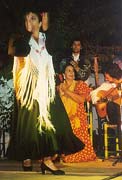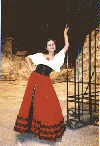The Gypsies, presently referred to by their political signifier Roma, are believed to have originally migrated from India, reaching the European continent in the 16th century. The term "Gypsy" -- with cognates including Gitan (French), Gitano (Spanish), Yiftos (Greek), and Gjuptsi (Macedonian) -- is usually an outsider's term with strongly negative connotations deriving from the false belief that the ancestors of these people came from Egypt. Other labels like Tsigan (found in Slavic languages) and Zigeuner (German) come from the Greek Atsingani, the name of a heretical Christian sect active in the Byzantine Empire during the 12th and 13th centuries. The heretical name attributed to this group strongly implies the strained relations between the Gypsies and Europeans.
 |
| Maria La Canastera: Spanish gypsy |
Since they were viewed as anti-Christian, one of the ways in which their marginalization was justified was in terms of immorality. The dark appearance of the Gypsy and the association of darkness with evil gave reason for the belief among Europeans that Gypsies lacked morals. This ideology operated on the preconceived stereotypes erected by non-Gypsies, and Christian encyclopedias as late as 1907 emphasized the perceived immoral behavior of the Gypsies as dangerously contagious. Because Gypsies in general lacked notions of morality in the eyes of Europeans, they were believed to have been ruled by their instincts with no sense of honor and sexual control, attributes that were austerely judged within 19th-century society. Strict codes of behavior and expression as manifestations of morality delineated the differences between the proper and the indecent.
 |
| Gypsies performing flamenco |
The alleged lack of morals among the Gypsies was vehemently applied to the critique of their sexual practices and their disregard for decency and respect toward the body, especially by Gypsy women. In much of the art, music, and literature of the 19th century, the female Gypsy in particular was characterized and stereotyped as free-spirited, strong, deviant, demanding, sexually arousing, alluring, and dismissive. This romantic construct of the Gypsy woman may be viewed in direct opposition to the proper, controlled, chaste, submissive woman held as the Victorian European ideal. This 'oriental' fascination with the forbidden and taboo world of the Gypsy other in music is best characterized in the opera Carmen.
Carmen, a Spanish Gypsy, overtly woos and seduces her arrestor: the captain of the guard, Don José. Don José allows her to escape her prison punishment, foolishly believing in her promises of love. Instead he is punished for his actions by his superiors and loses his job, honor, dignity, and pride. In the end, Don José, a broken man, pitifully pleads for Carmen's love, which she has intermittently promised to a rich bullfighter. In his despair and anger, Don José murders her. Although he commits a heinous crime, the audience continues to sympathize with him and identifies him as a victim of Gypsy shrewdness.

The exotic and mysterious Carmen was juxtaposed with the proper code of female behavior and morality of 19th-century Europe. Carmen is strong and confident and she unleashes her sexuality in order to gain favors and attain impunity. She craves status and recognition and does so at the cost of Don José, a man to whom she has promised her love. He, unable to control his sexual urges towards Carmen, is punished for his weakness. He loses everything he has worked for, and through him one senses that no good can come from reveling in sexual pleasure. He is a broken man because he gives in to temptation; he sacrifices his purity and masculine pride through his involvement with a Gypsy, portrayed as an unfaithful conniving prostitute.
Don José's transformation and Carmen's murder embodied a strong message to the 19th-century middle-class audience Carmen's deviant, immoral actions would not be tolerated and any contact with her would lead to pain and eventual social, spiritual, and moral ruin.
Adriana Helbig
Hancock, Ian: The Pariah Syndrome: An Account of Gypsy Slavery and Persecution) Ann Arbor: Karoma, 1985)
Lucassen, Leo: Gypsies and Other Itinerant Groups: A Socio-Historical Approach (New York: St. Martin's, 1998)
Mosse, George: Nationalism and Sexuality: Middle-Class Morality and Sexual Norms in Modern Europe (Madison: University of Wisconsin Press, 1985)
Tong, Diane, ed.: Gypsies: An Interdisciplinary Study (New York: Garland, 1985)
